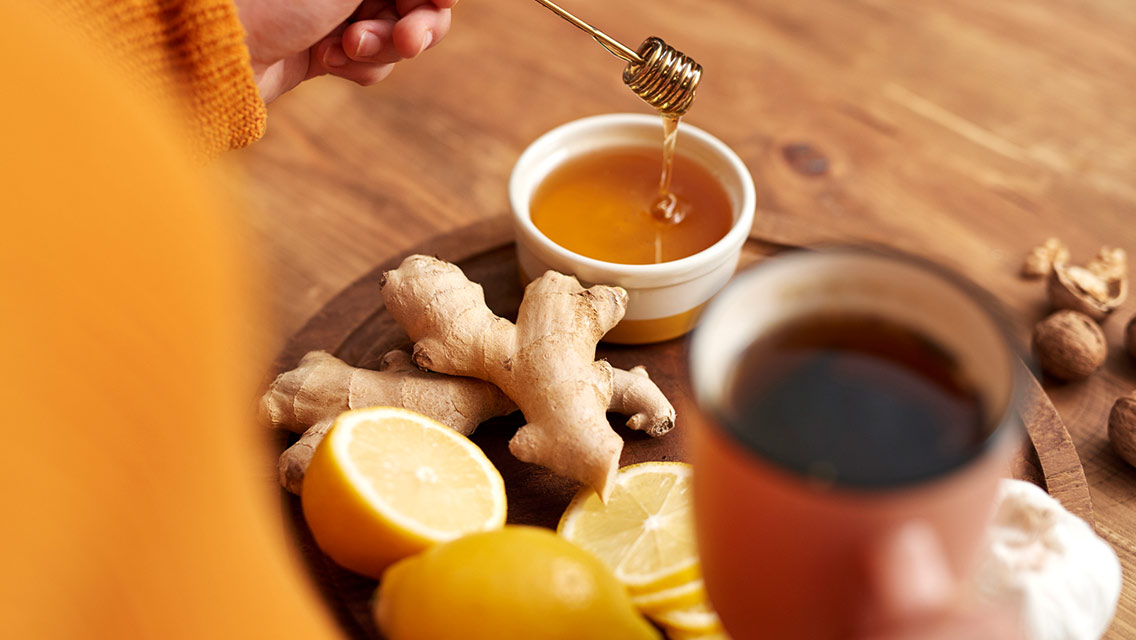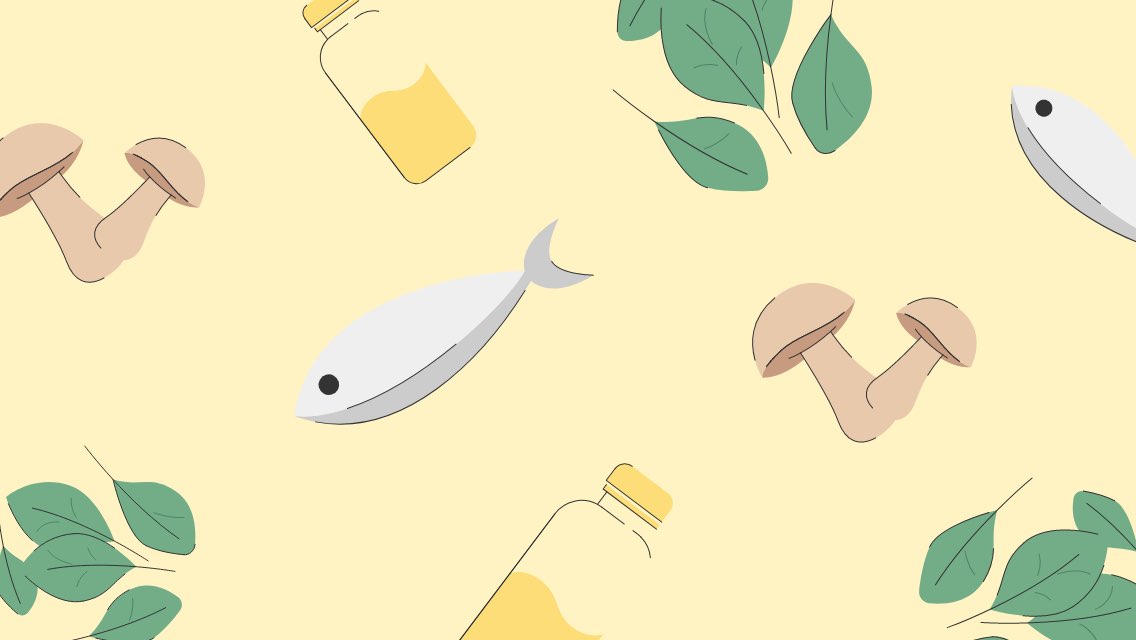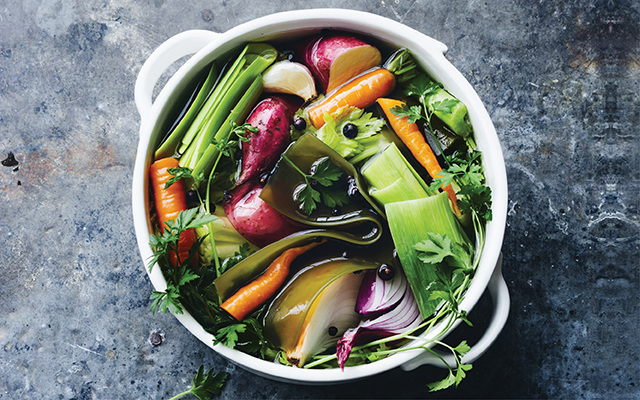Feel-Better Foods ⋅ Foods to Avoid ⋅ The Best Supplements for Colds
You’ve probably heard the saying “Feed a cold, starve a fever.” But is it true? Can you really use food to beat a cold?
It all depends on what you eat. Certain foods may help ease the severity of a cold or shorten its duration, while others can work against recovery.
“Most of our immune system resides in the digestive ecosystem,” explains integrative nutritionist Kathie Swift, RDN, MS. This means that what we eat has a direct impact on how quickly and effectively our bodies are able to fight off an infection.
Plenty of research has shown that certain foods boost immunity, fight inflammation, and help speed healing. Often, when we’re feeling rundown, we may instinctively gravitate toward them. Read on to learn why our bodies call out for those cold-relieving foods.
What Is a Cold?
A viral infection of the upper respiratory tract, the common cold exhibits familiar symptoms: runny or stuffy nose, congestion, sore throat, coughing, and sneezing. In some cases, it triggers a low-grade fever, body aches, a headache, and exhaustion.
The main cause of misery is not the virus itself but your immune system’s response to it. Cold bugs don’t do much damage to the respiratory lining, but the immune system treats them as mortal enemies and launches a full-scale attack. This all-out inflammatory response is the root of a cold’s uncomfortable symptoms, which is why eating anti-inflammatory foods can help you feel better faster.
The centuries-old practice of Traditional Chinese Medicine (TCM) views such inflammatory responses through the lens of body temperature: Your system is too hot or too cold.
“Everything in Traditional Chinese Medicine is related to temperature — the temperature of your body, the temperature of the food,” says nutritionist Judy Deutsch, MSRD, LDN. “You want to eat to balance out your temperature.”
Not surprisingly, many of the foods that TCM uses to help regulate body temperature are the same ones Western physicians recognize as inflammation fighters and immunity supporters. This can be hard to picture, so here’s what it looks like in practice.
How to Eat When You’re Sick
Western medicine and TCM both offer baseline rules for eating when you have a cold. First, choose easily digestible foods. You don’t want your body to divert its limited energy away from healing to digestion.
“No greasy foods, no fried foods,” says Los Angeles–based acupuncturist Mona Dan, LAc, MTOM, who also consults with her patients on nutrition. She suggests sticking with neutral and comforting meals.
Homemade soup is a great choice; it’s full of healing nutrients and is easy to digest. Soup is also a winner because it’s generally eaten hot. TCM practitioners believe cold drinks and raw foods are anathema to healing when you have a cold.
“TCM favors cooked foods and avoidance of too much cold, raw food, which taxes the spleen,” says Deutsch. “Your spleen helps distribute nutrients. Keeping it warm keeps the energy moving. Dampness, on the other hand, can accumulate and slow the healing process.” TCM believes the spleen circulates chi, or vital energy.
Attending to lifestyle factors like rest and recovery is also critical. If you’re feeling stressed, are overexercising, or are undersleeping, food won’t make up the deficit.
“You can’t expect to run yourself ragged and not sleep and then eat three oranges and miraculously recover from a cold,” says integrative clinical nutritionist Mary Purdy, MS, RDN.
“Supporting the body overall is key.”
Feel-Better Foods
Experts recommend these foods and beverages when the common cold strikes.
1. Garlic: This pungent, warming plant is anti-inflammatory and immune supportive, and multiple studies show it works against a variety of bacteria, including staphylococcus (the root of staph infections). There’s less research on garlic’s antiviral abilities, but one study found that colds developed less frequently in those taking a garlic supplement. When those participants did get sick, their colds ended more quickly.
2. Ginger: Infection-fighting foods, including garlic and ginger, “are extraordinarily fortifying to the body before and during a cold,” says nutritionist Mary Purdy. Some research suggests that fresh ginger may block a virus from taking hold; other studies indicate that it has powerful anti-inflammatory and antioxidant potential. Many Chinese folk remedies include ginger to help “expel cold” from the body. This is not that abstract: Eating the hot-tasting spice will warm you up when you have the chills.
3. Chili Peppers: Studies show that a nasal spray made with capsaicin, the active plant compound in hot peppers, can reduce congestion as well as sinus pain and pressure. Like ginger, hot peppers have a warming effect in the body.
4. Spices: Many spices are powerfully anti-inflammatory. An extensive body of research suggests that clove, coriander, turmeric, cinnamon, and black pepper all target inflammatory pathways in the body. Cinnamon, fennel, and other warm, fragrant spices can be particularly effective against colds.
Nutritionist Judy Deutsch notes that pungent spices also allow for increased movement of chi, which relieves liver stagnation. The liver is the body’s main organ of detoxification; supporting it can speed recovery.
5. Leafy Greens: Dark greens are ideal for boosting immunity and quieting inflammation. “You want to eat balancing foods, and green foods are very balancing,” says Deutsch. Still, raw foods are best avoided when sick, so instead of a salad, consider sautéing that spinach, she adds. Or choose other leafy greens that are good sautéed, like chard, collards, or kale. Add a couple cloves of garlic for additional healing support.
6. Bone Broth: Packed with essential vitamins and minerals that support the immune system, bone broth is a smart choice for staying nourished when you don’t have much of an appetite. “Bone broth and veggie broth can be nice, warm, hydrating beverages,” says nutritionist Kathie Swift. Bone broth in particular is a good source of easily digested protein.
7. Chicken Soup: A 2000 study published in the journal Chest found that chicken soup containing carrots, celery, onions, parsley, parsnips, sweet potatoes, turnips, salt, and pepper quiets the body’s overactive immune response to the common cold. Chicken is a good source of zinc, which studies suggest may shorten a cold’s duration. It’s also a good protein choice when you’re sick; it’s easier to digest than, say, a cheeseburger.
“You need protein for the growth and repair of tissue,” says Purdy. “A lack of protein, whether before or during sickness, is related to the onset of illness, length of illness, and recovery time.”
8. Other Soups: “Soups are strategic bastions of nutrients for colds,” says Purdy. That’s because they are easily digested and you can pack so many nutrients into one pot.
She likes the healing potential of a spicy, coconut milk–based soup because coconut has antiviral, antibacterial, and antifungal properties. Chili peppers help break up congestion. Garlic and ginger are warming and anti-inflammatory. Orange foods, such as sweet potatoes, carrots, and squash, provide vitamin A. Mushrooms are anti-inflammatory and immune supportive. Add lentils or tofu for protein.
9. Tea: There are plenty of cold-formula teas with echinacea, elderberry, and other herbs that support the immune system. Staying hydrated when you’re fighting a cold will help speed up your recovery, and plain old herbal tea — warmer and more comforting than water — is a great beverage choice. Many herbal teas also pack a nutrient punch. Swift suggests drinking hibiscus tea, citrus tea, or even a tea infused with compounds from brassica vegetables.
Even if you’re a tea traditionalist, she notes, all is not lost. “Even good old black tea has catechins,” which are powerful antioxidants.
10. Fluids: Sometimes a cold wipes out your appetite. In those cases, most experts advise listening to your body. Stay hydrated with plenty of water and herbal tea, avoiding sugary drinks that might increase inflammation.
“If you don’t have hunger, you can go a few days without eating as long as you keep yourself hydrated,” says integrative physician Lynn Wagner, MD. “Most people forget that the body will tell you what it needs.”
11. Honey: Rich in anti-inflammatory, antimicrobial, and immune-modulating properties, honey also contains antioxidants. Some research shows that it can reduce nighttime coughing in children with colds. (Most experts, however, recommend not giving honey to children under age 1 to avoid the risk of infant botulism.) “Honey is a cough suppressant and an immune booster,” says Wagner. Some studies suggest it may help resolve a runny nose triggered by allergies.
Some healthy sources of glucose may moderate inflammation caused by viral infections, according to recent research on mice. While more study is needed — especially before taking a liberal approach to sweet treats — this may explain why honey in tea feels so soothing during a virus. (The opposite appears to be true with bacterial infections: The same study found glucose made them worse.)
Foods to Avoid
The foods and beverages you shun when you’re sick can be just as important as those you choose to eat.
Sugar: Excess sugar drives up inflammation and puts the brakes on a healthy immune response — a damaging double whammy for healing. That said, a well-placed dollop of honey is an exception. And you don’t need to worry about the small amount of sugar in herbal remedies or the natural sweetness in fruit.
“This is not about fruit or lozenges. This is about cookies and cakes,” says nutritionist Mary Purdy. “The refined sugars can potentially suppress the immune system. Plus, refined sugar is likely to displace the essential and important nutrients that help to bolster our health.”
Dairy: Dairy products tend to increase mucus production and make it denser. “Dairy can prevent mucus from flowing more freely,” says Purdy. “But it is meant to flow because it gathers junk from the body and aims to deliver it out.”
Cold or Raw Foods: Traditional Chinese Medicine (TCM) practitioners view cold and raw foods as hard to digest and suggest avoiding them. The body needs to preserve energy for healing and not expend it on digestion.
Processed Foods: Largely devoid of nutrition, processed fare often contains ingredients, like refined sugar and trans fats, that can actively obstruct a speedy recovery. Acupuncturist Mona Dan and other TCM practitioners also caution against processed foods because of the demands they put on your digestion.
Alcohol: Skip the spirits when fighting a cold to allow your liver to focus on more important healing matters.
The Best Supplements for Colds
Integrative nutritionist Kathie Swift, RDN, MS, recommends the following supplements when fighting off a cold.
- Elderberry: Research suggests this fruit helps reduce the severity of cold symptoms and shorten their duration. Try it as a tincture or syrup.
- Medicinal Mushroom Extracts: Certain mushrooms, like reishi and cordyceps, have been shown to have antimicrobial, antiviral, antiallergic, and anti-inflammatory properties. Many also boost the immune system. Usually taken in capsules or as tea.
- Vitamin D: Optimal levels of vitamin D correlate with good health, and research suggests that D supplementation helps protect against the common cold. (Learn about the research at ELmag.com/vitamind.)
- Zinc: Supplementing with zinc may shorten the duration of colds by as much as 33 percent. Experts advise starting zinc within 24 hours of first symptoms.
- Vitamin C: Regular vitamin C supplementation may slightly reduce the duration of a cold (by 8 percent in adults and 14 percent in children, according to one study).
- South African Geranium (Pelargonium sidoides): This herb can help reduce the severity of cold symptoms and shorten a cold’s duration. It’s often sold under the brand name Umcka in chewables, instant drinks, and homeopathic capsules.
When Colds Aren’t So Cold
TCM practitioners distinguish between two types of colds, explains acupuncturist Mona Dan: cold-type and heat-type. Cold-type colds show up in familiar ways: runny noses, congestion, and the chills. Heat-type colds are characterized more by low-grade fever, sore throat, and yellow-colored mucus. These are sometimes confused with the flu.
No matter what type of cold you’re fighting, avoid raw and cold foods. Seek out spices, which are almost universally anti-inflammatory.
When you have a heat-type cold, however, you might feel better if you avoid the ginger and chilies and opt for less-pungent foods and spices — including peppermint, marjoram, and white pepper — that offer cooling properties.
This originally appeared as “Feed a Cold” in the October 2019 print issue of Experience Life.




This Post Has 0 Comments